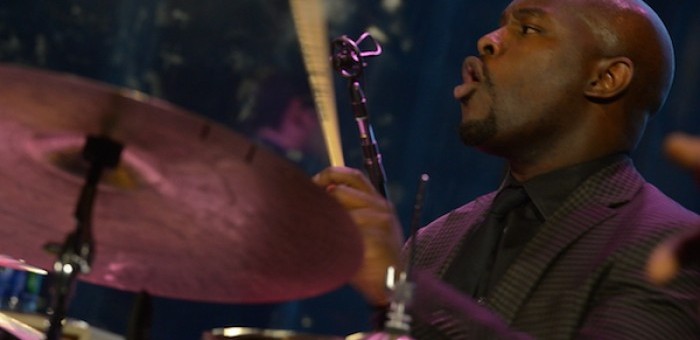Jan 13, 2026 2:09 PM
More Trump-Kennedy Center Cancellations
The fallout from the renaming of the John F. Kennedy Center for the Performing Arts to include President Donald…

Grammy-winning drummer Ulysses Owens Jr. performs at Dizzy’s Club Coca-Cola in New York on April 29.
(Photo: Courtesy of Sunshine Sachs)In a celebration of “Ellington And Beyond,” the immensely talented drummer Ulysses Owens Jr. and his equally brilliant quartet brought a bold, endearing vision of the Duke’s music to Dizzy’s Club Coca Cola in Manhattan on April 29–30 as part of the International Jazz Day festivities.
Owens—a two-time Grammy winner and a familiar name to DownBeat readers—has shared Dizzy’s stage over the past few years with such luminaries as bassist Christian McBride, saxophonist Steve Wilson, vibraphonist Steve Nelson and piano prodigy Joey Alexander.
Owens has taken on big, bold projects in the past. Last year, he debuted his work “Ulysses In 3” at New York’s Park Avenue Armory, exploring the work of choreographer Ulysses Dove, the novel Ulysses by James Joyce and his own compositions.
In July, Owens debuted his seven-movement suite Stages Of Us in the Museum of Modern Art’s sculpture garden as part of the institution’s “Summergarden Series.”
Owens has built a reputation as a creative collaborator but he also excels in the role of bandleader. Indeed, his directorial prowess gleamed brightly at Dizzy’s, with a top-flight ensemble consisting of bassist Yasushi Nakamura, “King of D.C. piano” Allyn Johnson and the alternating talents of Jazz at Lincoln Center Orchestra members Marcus Printup (trumpet) and Ted Nash (saxophone). The Friday evening show celebrated Duke Ellington’s birthday of April 29, 1899.
Owens kicked off the proceedings with a furious rudimental drum solo, recalling drumming master Kenny Washington. The other musicians soon jumped into the fast lane with Owens, Nash releasing a Bird-fired solo of heated squalls and hard high notes followed by a graceful descent.
Printup’s lyrical trumpet solo brought out Owens’ brushes, and the soup was furiously stirred. Owens provided considerable sonic girth to Printup’s solo, loud bass drum jabs driving the entire quartet. Johnson’s solo—a knife-edged piano workout—was followed by Owens’ closing solo, a speed demon display of power rolls, unison sticking thrills and drilling bass drum assaults.
A version of Ellington and Billy Strayhorn’s “U.M.M.G. (Upper Manhattan Medical Group)” and an atypical version of “Mood Indigo” followed. As Nakamura opened this “Indigo” with an extended bass solo, he was supported by Owens’ graceful mallet work. The song’s melody, conveyed through clarinet and trumpet, took on a happy, urbane bent, like music to accommodate a Sunday stroll in your finest dress.
The quartet’s traditional “Zip-A-Dee-Doo-Dah” vibrated around the club like fairy dust, inspiring audience members to tap their feet and snap their fingers. With its instrumental-fire-meets-studied-tradition template set, the quartet then entertained the crowd of Manhattanites and tourists with some salty Afro-Cuban rhythms. Owens adjusted his focus appropriately, laying out an extroverted rhythm of clanging cowbell, booming tom tom and popping cymbal accents, literally quoting the melody of “Take The ‘A’ Train.”
Once locked into a pocket, Johnson unleashed a chunky solo, the rhythm section supporting his notes with a groove big enough to drive a Cadillac through. Suddenly the band was blazing. Owens’ brushes sizzled, and the song’s conclusion was met with loud applause.
After an unusual rendition of Ellington’s “On A Turquoise Cloud,” performed by soprano Candice Hoyes (whose album of the same name was produced by Owens), the quartet performed “The Star Crossed Lovers” with Nash delivering a beautiful Johnny Hodges-worthy solo complimented by non-Hodges friendly squeaks.
Owens’ group closed with a dramatically arranged “It Don’t Mean A Thing” that was initially unrecognizable. Spreading the melody over the instruments in straight time, cut-time then double-time, the music flew like a missle, driven by Owens’ head-slamming single-stroke rolls and final, walloping bass-drum accents.

Belá Fleck during an interview with Fredrika Whitfield on CNN.
Jan 13, 2026 2:09 PM
The fallout from the renaming of the John F. Kennedy Center for the Performing Arts to include President Donald…

Peplowski first came to prominence in legacy swing bands, including the final iteration of the Benny Goodman Orchestra, before beginning a solo career in the late 1980s.
Feb 3, 2026 12:10 AM
Ken Peplowski, a clarinetist and tenor saxophonist who straddled the worlds of traditional and modern jazz, died Feb. 2…

The success of Oregon’s first album, 1971’s Music Of Another Present Era, allowed Towner to establish a solo career.
Jan 19, 2026 5:02 PM
Ralph Towner, a guitarist and composer who blended multiple genres, including jazz — and throughout them all remained…

Rico’s Anti-Microbial Instrument Swab
Jan 19, 2026 2:48 PM
With this year’s NAMM Show right around the corner, we can look forward to plenty of new and innovative instruments…

Richie Beirach was particularly renowned for his approach to chromatic harmony, which he used to improvise reharmonizations of originals and standards.
Jan 27, 2026 11:19 AM
Richie Beirach, a pianist and composer who channeled a knowledge of modern classical music into his jazz practice,…